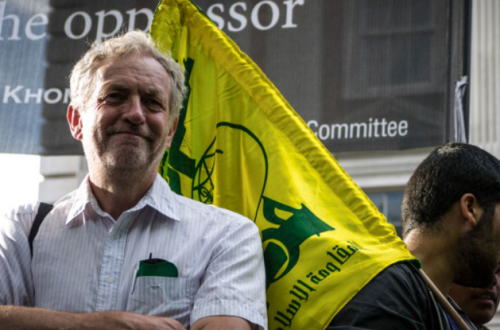This is a cross-post from Paul Bernal
That time of year is coming when once again I dare to hope that Labour will become I party I can support again. It’s a hope that is pretty forlorn, and has been for many years, but I seem to be unable to stop myself from dreaming of the possibilities. Right now, it seems to me, they have a real opportunity to change, and to be bold in trying to set an agenda for the future. Nick Clegg’s deeply depressing speech to finish the Lib Dem conference should have shaken them up: it was nothing less than appalling, representing the worst kind of self-satisfied ‘career politics’, attempting to suggest that what we all need is ‘more of the same’. No. We don’t. We need something different. Can Labour provide it? I very much doubt it, but I can’t help myself thinking about what they could do to give me more hope – so here, in no particular order, are ten things I’d like to hear, and a few I’d very much like NOT to hear.
1: Civil liberties. The first crucial step would be an admission that Labour got it all wrong about civil liberties under Blair and Brown, that a new way will be forged, embracing civil liberties. Sadiq Khan has already made noises about civil liberties, accurately describing the way that the Lib Dems and Tories have failed dismally on civil liberties, from the Snoopers’ Charter to Secret Courts – but with John Reid, David Blunkett, Charles Clarke and Jack Straw still chuntering away on the sidelines and the memories of ID cards, 42 day detention and collaboration with the excesses of the US can anyone take Labour seriously? Civil liberties should be a Labour issue – but they need to acknowledge the extreme errors of the past if they have any chance to move on.
2: Re-nationalisation. Labour needs to stop being afraid of being portrayed as a party of the past when it comes to nationalisation. That doesn’t mean wholesale renationalisation – but an understanding that some things are better off in public ownership. There are two that stand out right now – the railways and the Royal Mail. An announcement of a policy to renationalise the railways would be both popular and appropriate – and a bold statement that the Royal Mail sell-off would be reversed could, as Owen Jones and others have suggested, undermine the current move and make the re-nationalisation possible in the future.
3: Education. One of the biggest failures of Labour in opposition has been its failure to oppose Michael Gove’s appalling education policies. We’ve had feeble witterings from Stephen Twigg, abysmal ideas like military schools, and very little else. Education needs much more attention – and a really radical education programme should be possible, one that says boldly that the whole ‘free schools’ idea will be abolished. If it was up to me they’d go a lot further: moving towards the disappearance of state-funded faith schools, and the removal of charitable status of independent schools, but I realise that’s just pipe-dreaming.
4. Disability. For me, the worst part of this hideous coalition’s policies has been how they have treated disabled people. Labour needs to change this – and that means far more than just reversing the horrendous headline stuff, it means fighting actively against the demonisation of disabled people. It means looking at ways to promote disabled people within government too – a shadow sp
5. Reverse the bedroom tax – frankly, if they don’t do this, they don’t deserve to be elected. This should be a simple, direct and bold statement.
6. Taxes. Labour needs to be brave enough to talk about tax – at the very least there should be more open statements that the rich don’t pay enough tax! This should be accompanied by a proper attempt at putting together a wealth tax, one that really works. Similarly, to look more actively at corporation taxes – and not to engage in the race to the bottom with taxes that George Osborne has made his speciality. A genuine look at the ‘Robin Hood’ tax would also be very welcome.
7. Justice. A restoration of the funding of Legal aid should be the starting point – along with a bold statement about its importance. Labour is supposed to be the party of the ‘little people’: without proper access to justice, how can ordinary people – or rather people with ordinary levels of resources – fight for their corner. That is not to say that legal aid shouldn’t be reformed – it should, but it should be a reform that actually means reform, rather than destruction, and a reform that isn’t simply driven by a desire to drive down costs, rather to improve access to justice.
8. Health. Say straight out that the NHS creeping privatisation will be first blocked then reversed. A new approach to our health service may well be necessary – but driving it along the current path, one which Labour did a great deal to start – is a recipe for disaster. Labour shouldn’t be afraid to say so. No more PFI.
9. Citizen’s income. The topic of ‘welfare’ or better ‘social security’ is another crucial area – and one upon which Labour should have been fighting far more and far more loudly over the last three years. The way in which the agenda has been shifted to the hideous straw man of ‘scroungers vs strivers’ is sickening: the way that Labour has not only failed to oppose this propaganda but has in many ways embraced it should be deeply shameful to the whole of the Labour Party. That agenda needs to be attacked, boldly and aggressively, right now. It may be too late – too much time has been wasted – but it still needs to be done. Embracing a more radical system such as the citizens income would be good – but the propaganda war needs to be fought too.
10. The internet. It’s my specialist area, but I do think it matters. Labour has got its digital policy horribly wrong in the past – it needs to break from that past. The repeal of the Digital Economy Act should be a first step, along with the promise not to bring back such hugely counterproductive measures as the Snoopers Charter, nor to fall in with the populist but nightmarish plans for default porn-filters. Above all, though, what I’d like from Labour here is a promise to talk to the people who understand the internet, not to the people who write tabloid headlines. A good set of policies for the internet would make the Labour Party more attractive to young people, be good for the economy for the future and for all kinds of other things.
A few things I DON’T want to hear
There are a lot of these – if I never hear the phrase “hard-working families” ever again I will be delighted, for example. Treat people as people, not just as economic units. A vast number of people in the UK work far too hard – in ways that damage their lives, their families and the whole community. That hideous phrase “difficult decisions” will doubtless be trotted out a few times. No, those decisions aren’t difficult for the people making them, they’re difficult for the people who suffer the consequences. I also don’t want to hear anyone say that they’re going to “listen to people’s concerns about immigration”, if that actually means they’re going to pander to the xenophobia spread by the likes of the Daily Mail and Daily Express. The portrayal of immigration as a major problem is another of those things that saddens me about the current political debate – but I fully expect to hear exactly what I don’t want to hear from Labour on this….
In all of this I expect to be disappointed. I’ll probably end up throwing a few things at my television as I watch the conference, and expect to find myself promising never to vote Labour again. I hope I don’t – and I’ll keep hoping – but it’s a hope that I realise is almost certainly forlorn.


